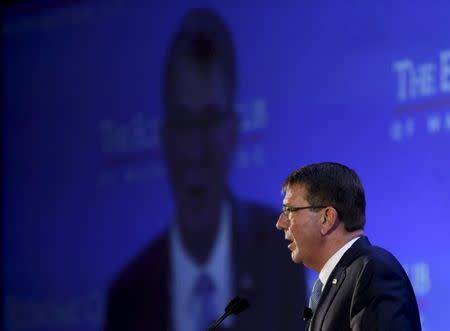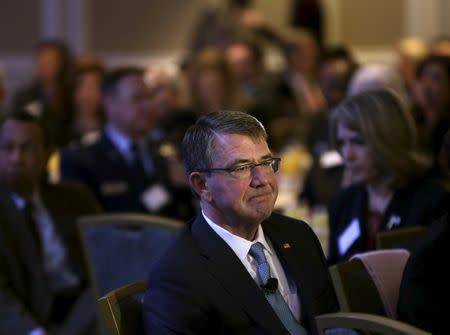U.S. defense budget focuses on changing security environment: Carter
By Andrea Shalal and David Alexander
WASHINGTON (Reuters) - U.S. Defense Secretary Ash Carter said on Tuesday the Pentagon would seek a $582.7 billion defense budget next year and reshape its spending priorities to reflect a new strategic environment marked by Russian assertiveness and the rise of Islamic State.
Carter, speaking to the Economic Club of Washington, said the funding request was in line with last year's congressional budget deal and the spending plan would be refocused to address the five big challenges facing the U.S. military: Russia, China, North Korea, Iran and Islamic State.
"Today's security environment is dramatically different than the one we've been engaged with for the last 25 years and it requires new ways of thinking and new ways of acting," he said.
Carter's remarks came a week ahead of the formal rollout of the administration's 2017 budget. The Pentagon is in the process of cutting projected spending by nearly $1 trillion over a decade but the congressional budget deal last year raised the department's spending caps by $25 billion for 2016 and $15 billion for 2017.
The Pentagon received $580 billion this fiscal year, including a $521 billion base budget and $59 billion in war funding, which is not constrained by budget caps. The budget deal set the Pentagon's base budget for 2017 at about $524 billion and war funding at a minimum of $59 billion.
But a top Republican lawmaker quickly accused President Barack Obama of failing to use the authority given him by the deal to boost the Pentagon's war-funding budget.
"The president's response to a security environment that is quickly degrading is to further cannibalize our military capability," Representative Mac Thornberry, the chairman of the House of Representatives Armed Services Committee, said in a statement.
Carter said that to address the changing strategic environment the Pentagon would seek $7.5 billion for the war against Islamic State in the 2017 fiscal year that begins Oct. 1, a 50 percent increase over spending on the conflict this year.
He said the increase was critical because the United States has used so many smart bombs and laser-guided rockets against the militants in Iraq and Syria that it is running low on the weapons and needs to invest $1.8 billion for 45,000 more.
Carter said the Pentagon would ask for $3.4 billion to boost military training and exercises aimed at reassuring European countries concerned about Russia, which seized Ukraine's Crimean peninsula in 2014 and has worried NATO allies with its strategic bomber flights.
Obama said in a statement the request for European training, a four-fold increase from last year's $789 million, would enable the United States to strengthen the U.S. military posture in Europe. NATO Secretary-General Jens Stoltenberg called the move a "clear sign" of the U.S. commitment to European security.
Carter also voiced concern about China's military intentions. Beijing has been rapidly developing missiles and other weapons that could force the U.S. military to operate farther from shore in the case of a conflict.
"Key to our approach is being able to deter our most advanced competitors," Carter said. "We must have - and be seen to have - the ability to impose unacceptable costs on an advanced aggressor."
To build upon the U.S. military's technological superiority, Carter said the Defense Department planned to invest $71.4 billion next year in research and development, much of it aimed at boosting strategic capabilities.
The military has been developing drone aircraft and boats that are capable of swarming an adversary, preventing it from threatening U.S. warships and jets.
He said the Pentagon also would spend $8.1 billion on undersea warfare in fiscal 2017 and more than $40 billion in the next five years.
(Reporting by Andrea Shalal, David Alexander and Roberta Rampton in Washington and Robin Emmott in Brussels; Editing by Bill Trott)



